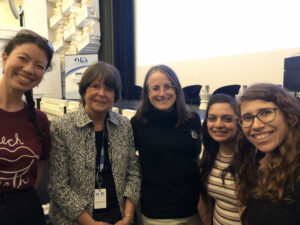“Can I halp you?” The Salary-Celery merger
0 RepliesIf you’re in south-eastern Australia or New Zealand, you’ve probably noticed kids pronouncing words with /e/ (as in ‘egg’) more like /a/ (as in ‘at’) before the sound /l/.
They say things like ‘Can I halp you?’, ‘I falt a bit sick’ and ‘I can do it mysalf’. They pronounce ‘salary’ and ‘celery’ as homophones, hence the name linguists have given this vowel shift: the Salary-Celery merger.
The ‘a’ before /l/ in ‘asphalt’ was being pronounced /e/ when I was scraping my knees on it at school, but ‘a’ pronounced /e/ mainly occurs before /n/, as in ‘any’, ‘many’, ‘secondary’ and ‘dromedary’.
Several other vowels have also morphed a bit before /l/, consider:
- all, ball, call, fall, gall, hall, mall, also, almost, always etc (but not ‘shall’, ‘ally’, ‘alley’, ‘ballad’, ‘gallop’, ‘pallet’, ‘tally’ or ‘alas’).
- walk, talk, chalk, stalk, and baulk (US balk) and caulk (US calk).
- half/halve, calf/calve, behalf (but not ‘salve’ or ‘valve’).
- salt, halt, malt, gestalt, alter, exalt, Walter (but not ‘shalt’).
- fault, vault, cauldron, assault, cauliflower, hydraulic, somersault (but not ‘haul’ or ‘maul’).
The sound /l/ has a vowel-like quality and tends to ‘colour’ the preceding vowel. This is useful for teachers to know, so they can give any confused kids plenty of practice spelling affected words (there’s lots of opportunities to practice writing ‘short vowels’ in a range of phonetic contexts, including before /l/, in Spelfabet Workbook 1)
When kids insist that they hear an /a/ (as in ‘cat’) in ‘halp’, I ask them to say the word in their ‘spelling voice’ (as it’s written), with /e/ (as in ‘red’). Good spellers often say that they pronounce odd spellings a bit weirdly when writing them (Wed-nes-day, bus-i-ness), as a kind of mnemonic. Spelling pronunciations sometimes crop up in comedy too, for example the kniggits in Monty Python and the Holy Grail.

US reading/spelling guru Professor Linnea Ehri was recently here in Melbourne courtesy of Learning Difficulties Australia (the selfie at right proves we met her), and talked about this strategy, which she calls the “Spelling Pronunciation Strategy”. She says that in Connectionist theory, to put a word’s spelling into long-term memory, the letters must be connected to ‘phoneme mates’ in the pronunciations of the word.
To use the Spelling Pronunciation Strategy (AKA “Spelling Voice” in the program Sounds-Write) you separate and say each syllable with stress, and pronounce all the letters. Prof Ehri’s examples were “ex cell ent ”, “lis ten”, “choc o late”, and “Feb ru ary”. She cited two studies (Drake & Ehri, 1984 and Ocal & Ehri, 2017) showing that assigning spelling pronunciations enhanced memory for spellings, in 4th graders and college students.
So in summary, it’s not just harmless to say words in a slightly funny way to halp, sorry, help yourself remember their spellings. It’s officially evidence-based.




Leave a Reply